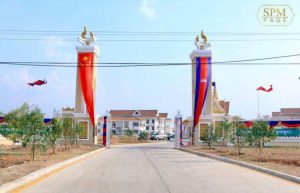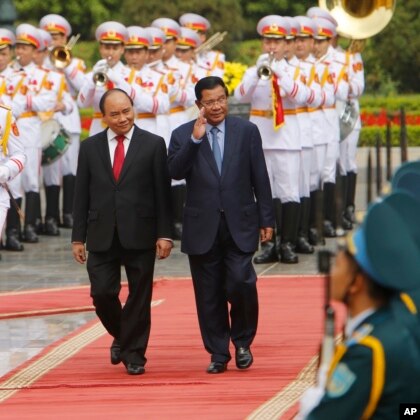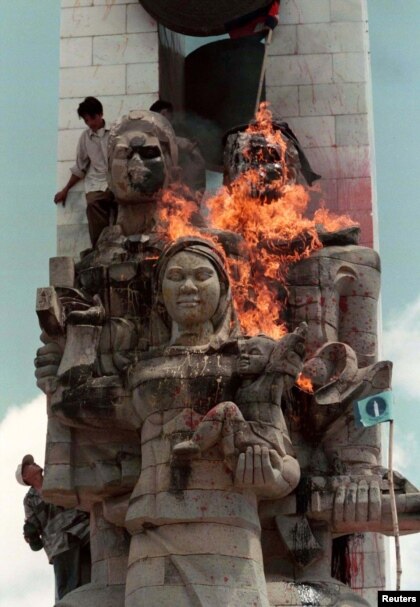Hun Sen has become staunch puppet of both China and Vietnam
Posted by: Cambodian | Posted on: July 25, 2018This analysis, Mr. Sophan emphasized on drifting authoritarian of staunch puppet to both China and Vietnam of Prime Minister Hun Sen in which has possessed deadly side-effect like what was happening during the leadership of Pol Pot (1975-1979). Watching the full analysis in youtube.
====
Nobody’s Puppet
Prime Minister Hun Sen told an American filmmaker he is a patriot who resists any foreign influences, despite allegations to the contrary from Cambodia’s opposition and analysts.

The entrance to Kratie University flanked with Chinese and Cambodian flags in a photo posted on Facebook last week.
PHNOM PENH, CAMBODIA Cambodian Prime Minister Hun Sen addresses the politically divisive issue of his historic links with the Communist Party of Vietnam by saying he has never been a “puppet” of Hanoi but is a patriot who always resisted foreign influence on Cambodia.
“A number of people claim I am a person who was installed by Vietnam; they also said I am a puppet of Vietnam,” Hun Sen said in unreleased video footage of an interview with American filmmaker Robert Lieberman for his documentary “Angkor Awakens.”
Hun Sen denied the allegations in the interview.
About this series
This is the first of a multi-part series, based on a rare video interview with Hun Sen by American filmmaker Robert Lieberman for his 2016 documentary “Angkor Awakens.”
“The reality is that Hun Sen belongs to Cambodia [and] Cambodia needs independence,” the prime minister said. “I also hate those who want to have political influence on Cambodia – we don’t accept it.”
Lieberman conducted the September 24, 2015 interview in a New York hotel. VOA recently obtained the interview from the filmmaker.
For decades, the opposition – the once-formidable royalist party FUNCINPEC, former opposition leader Sam Rainsy, and the now-dissolved Cambodia National Rescue Party (CNRP) – have clung to this and other claims in order to undermine Hun Sen’s image and to tap into lingering anti-Vietnamese nationalism in Cambodia.
Many older opposition members come from an alliance of political groups led by then-Prince Norodom Sihanouk that was based on the Thai-Cambodian border. The alliance battled Vietnam during its occupation of Cambodia from 1978, the final days of the Khmer Rougeregime, to 1989.
Campaigning for Cambodia’s July 29 elections started July 7, but with the Cambodian People’s Party (CPP) government’s decision to ban its only challenger, the CNRP, last year, the role of anti-Vietnamese politics has become somewhat of a moot point.
Hun Sen has mostly ignored the opposition’s accusations that he is a stooge of Hanoi while never hiding his good relations with Vietnam. These go back to 1977 when he and other Khmer Rouge defectors crossed into Vietnam. They were welcomed and trained to form a new Cambodian government that was installed by Vietnam after it ousted the Khmer Rouge regime in January 1979.
Hun Sen became foreign minister and then prime minister in 1985. He has held onto power since with political maneuvering that has won him democratic elections and by crushing opponents with brazen armed force.

FILE – Cambodian Prime Minister Hun Sen, center right, and his Vietnamese counterpart Nguyen Xuan Phuc, review an honor guard in Hanoi, on Dec. 20, 2016. (Tran Van Minh | AP)
Vietnam backs, not controls, Hun Sen rule
According to a recent publication by Stephen Heder, a respected Cambodia scholar, Hun Sen’s CPP and the Communist Party of Vietnam (CPV) have long had a “comprehensive relationship” in which they strongly support each other and defend their respective roles from any political challenges.
Hun Sen’s recent banning of the opposition and ongoing crackdown on independent media and civil society would thus have Hanoi’s support, he argues, though that doesn’t mean that Vietnam dominates in Cambodia.
“[K]eeping the CNRP out of power, if necessary by eliminating it from the contest for power, is a strongly shared CPP-CPV common interest that lies at the core of their comprehensive relationship and is most concretely manifest in the relationship between their security forces,” wrote Heder, a research associate at the School of Oriental and African Studies in London. “However, this and other CPP-CPV common interests do not add up to Vietnamese domination of Cambodia, as is shown, inter alia, by Cambodia’s refusal to toe Vietnam’s line on the South China Sea,” according to Heder.
In recent years, Hun Sen’s ever tightening embrace with China has been a point of growing media and diplomatic attention. Beijing has provided support and massive loans for his government as it abandoned Western-backed multiparty democracy, while Hun Sen in turn gives diplomatic support for China’s quest for dominance in the South China Sea region.

Demonstrators set fire to a monument marking Cambodian-Vietnamese friendship in Phnom Penh August 30, 1998. (Reuters)
Cambodia’s relations with Western countries have suffered since 2017, with cuts in donor support and the U.S. recently slapping sanctions on some Cambodian officials. In 2017 alone, China accounted for 30 percent of all investment in China, according to The Asean Post.
Ear Sophal, an associate professor at Los Angeles’ Occidental College who has researched Cambodia’s aid dependency and China’s global resource demand, said Hun Sen’s claim of resisting foreign influence was dispelled by the fact that Vietnam and, more recently, China gained control of large swathes of Cambodia’s natural resources, infrastructure and economy at the expense of ordinary Cambodians.
“Cambodia is now seen as having been for rent for a long time,” he said. “The renter is currently China. Perhaps we can say Vietnam owns Cambodia, while China rents Cambodia from Vietnam.”
Sophal added, “But [Hun Sen] does need more friends than only Vietnam and China – he needs to have Western friends too.”
====
Cambodian people benefit from CPP’s policies












Comments are Closed